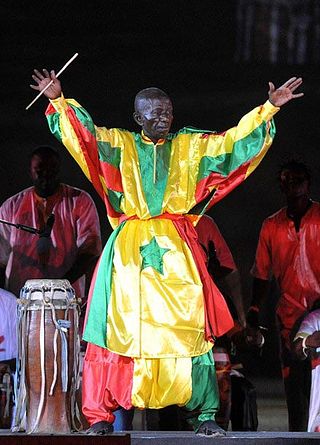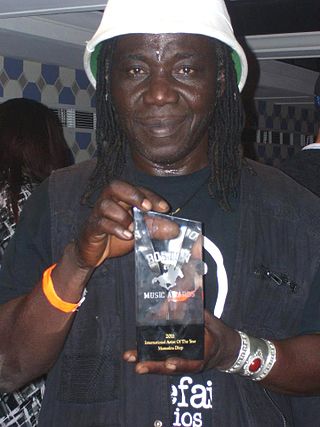
Youssou N'Dour is a Senegalese singer, songwriter, musician, composer, occasional actor, businessman, and politician. In 2004, Rolling Stone described him as, "perhaps the most famous singer alive" in Senegal and much of Africa and in 2023, the same publication ranked him at number 69 on its list of the 200 Greatest Singers of All Time. From April 2012 to September 2013, he was Senegal's Minister of Tourism.

Senegal's music is best known abroad due to the popularity of mbalax, a development of conservative music from different ethnic groups and sabar drumming popularized internationally by Youssou N'Dour.

The music of the Gambia is closely linked musically with that of its neighbor, Senegal, which surrounds its inland frontiers completely. Among its prominent musicians is Foday Musa Suso. Mbalax is a widely known popular dance music of the Gambia and neighbouring Senegal. It fuses popular Western music and dance, with sabar, the traditional drumming and dance music of the Wolof and Serer people.

A cajón is a box-shaped percussion instrument originally from Peru, played by slapping the front or rear faces with the hands, fingers, or sometimes implements such as brushes, mallets, or sticks. Cajóns are primarily played in Afro-Peruvian music, but have made their way into flamenco as well. The term cajón is also applied to other box drums used in Latin American music, such as the Cuban cajón de rumba and the Mexican cajón de tapeo.

Afro-Cubans or Black Cubans are Cubans of full or partial sub-Saharan African ancestry. The term Afro-Cuban can also refer to historical or cultural elements in Cuba associated with this community, and the combining of native African and other cultural elements found in Cuban society, such as race, religion, music, language, the arts and class culture.

Susie Ibarra is a contemporary composer and percussionist who has worked and recorded with jazz, classical, world, and indigenous musicians. One of SPIN's "100 Greatest Drummers of Alternative Music," she is known for her work as a performer in avant-garde, jazz, world, and new music. As a composer, Ibarra incorporates diverse styles and the influences of Philippine Kulintang, jazz, classical, poetry, musical theater, opera, and electronic music. Ibarra remains active as a composer, performer, educator, and documentary filmmaker in the U.S., Philippines, and internationally. She is interested and involved in works that blend folkloric and indigenous tradition with avant-garde. In 2004, Ibarra began field recording indigenous Philippine music, and in 2009 she co-founded Song of the Bird King, an organization focusing on the preservation of Indigenous music and ecology.
The Fania All-Stars is a musical group formed in 1968 as a showcase for the musicians on Fania Records, the leading salsa music record label of the time.

Doudou Ndiaye Rose was a Senegalese drummer, composer and band leader, and was the recognized modern master of Senegal's traditional drum, the sabar. He was the father of a musical dynasty that includes some of the most successful traditional musicians of contemporary West Africa. He was one of the first musicians to bring Senegalese traditional music to the attention of the world.
Mbalax is the urban dance music of Senegal and the Gambia. The musical style is rooted in the indigenous instrumental and vocal styles accompanied by polyrhythmic sabar drumming of the Wolof, a social identity that includes both the original Wolof people of the Greater Senegambia region and the urban panethnic identity that arose during colonialism. A cultural value proved by Wolof is their one's and respect of other cultural and musical practices. Therefore the origins of mbalax include a fusion of Wolof, Soce, and Serer music, rhythms, and instrumentation. The Wolof ability to include the diverse styles from Senegambian groups has allowed the sabar and its modern music formation to thrive. It is not uncommon, for example, for a sabar event to include music of the Serer such as the njuup, which is connected to sacred ndut rite ceremonies. In this way many ethnic groups may participate and the inclusion also increases the accessibilyt and popularity of the genre. In the 1970s, mbalax arose as Senegalese fused indigenous music styles with urban dance music from the African diaspora, the West, and the continent. These foreign sounds included U.S. soul, jazz, and salsa. Afro Cuban musics from the diaspora, Congolese rumba, and rock were also fused with the rhythms of sabar that were now played on the electric bass, guitar and keyboards.

Armando Peraza was a Cuban Latin jazz percussionist and a member of the rock band Santana. Peraza played congas, bongos, and timbales.

"Watermelon Man" is a jazz standard written by Herbie Hancock for his debut album, Takin' Off (1962).

Francisco Aguabella was an Afro-Cuban percussionist whose career spanned folk, jazz, and dance bands. He was a prolific session musician and recorded seven albums as a leader.

MAMADOU is a Senegalese music band. Originally called "Mamadou Diop and the Jolole Band", the group was founded in early 1998, later simplifying their name to "MAMADOU" in late 2000.
Musa M'Boob is a Gambian musician.
Sy is a given name, nickname/hypocorism and surname which may refer to:

Leon Mobley is a percussionist and drummer. He is founder and artistic and musical director of Da Lion and Djimbe West African Drummers and Dancers, an actor, and a member of Grammy-winning band Innocent Criminals.
Donato & Estéfano was a Latin pop duo formed by the collaboration of Donato Poveda of Havana, Cuba, and Fabio Alfonso Salgado ("Estéfano"), a native of Cali, Colombia. Donato y Estefano released three studio albums through 1995–1999 and were nominated twice for Pop Group of the Year at the 8th (1996) and 9th (1997) Lo Nuestro Awards. Their Greatest Hits album was released in 2000.

Aurelio Martínez, professionally known as Aurelio, is a Honduran musician and politician. He is a singer, percussionist, and guitarist known for his Garifuna music and is considered a Cultural Ambassador of the Garifuna people. According to the Guardian, he became the leading Garifuna performer after the death of musician Andy Palacio.
Eriko Mukoyama, known as Anyango, is a female nyatiti player.

Joseph Gramley is an American multi-percussionist, teacher and composer, and a founding member of the Silk Road Ensemble. As a solo performer he each year commissions and premieres new works from such emerging composers as Kojiro Umezaki and Justin Messina. His first solo recording, American Deconstruction, featuring performances of five milestone works in multi-percussion's modern repertoire, appeared in 2000 and was reissued in 2006. His second CD, Global Percussion, was released in 2005.













